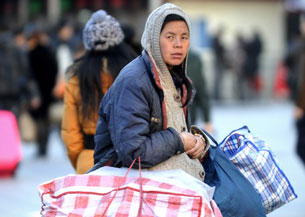China: Petitioners freed for New Year
| Publisher | Radio Free Asia |
| Publication Date | 8 February 2013 |
| Cite as | Radio Free Asia, China: Petitioners freed for New Year, 8 February 2013, available at: https://www.refworld.org/docid/511ce46423.html [accessed 21 May 2023] |
| Disclaimer | This is not a UNHCR publication. UNHCR is not responsible for, nor does it necessarily endorse, its content. Any views expressed are solely those of the author or publisher and do not necessarily reflect those of UNHCR, the United Nations or its Member States. |
2013-02-08
Chinese authorities are kicking campaigners out of an extrajudicial detention facility in Beijing ahead of the holidays.
 A Chinese woman prepares to take the train at the Beijing railway station ahead of the Lunar New Year, Feb. 4 , 2013. AFP
A Chinese woman prepares to take the train at the Beijing railway station ahead of the Lunar New Year, Feb. 4 , 2013. AFP
As millions of Chinese take to the road, air, rail and sea to make it home in time for Lunar New Year festivities on Sunday, overcrowding at a Beijing detention center has prompted the authorities to free many inmates.
At Majialou, a detention center on the outskirts of Beijing used to hold those who complain about their local governments, around 1,000 people are being told to leave, in a move which rights activists say could be prompted by concerns over China's international image.
Tian Lan, a petitioner from neighboring Hebei province, said she was released from the Majialou holding center on Friday.
"When I got out of there, they were in the process of emptying Majialou," Tian said. "There were a lot of security guards hired by different provinces there."
However, she said that many petitioners have no homes and no income, and their main priority was to stay warm and fed.
"Some people didn't want to leave because it was too cold, and they had no money for food or anywhere to sleep," she said.
"At least in there they had somewhere to sleep and a steamed bun to eat."
Tian said the detention center, which is an extrajudicial facility, or "black jail," appeared to be shutting down over the holiday period, and had been crammed with people.
"There are different detention rooms depending on which province you come from," she said. "They were jam-packed with at least 1,000 people; all of them people who came to Beijing to complain."
Kicked out
Zhejiang petitioner Shen Zhihua said she was detained by police outside the United Nations offices in eastern Beijing on Sunday and taken to Majialou, before being escorted home by officials from her hometown on Friday.
But she said she had already bought a train ticket to return to Beijing on Saturday.
"Right now, they keep you for a day in Majialou to see if anyone [from your local government] comes to get you, but if they don't, they kick you out the next day."
"They won't let you stay there."
Hubei petitioner Jing Mingguo said the new policy didn't prevent local governments from holding petitioners in their own "black jails," however.
"There were 26 of us locked up in Huer Primary school; the shortest period of detention was more than two months," Jing said. "The longest was six months."
He said the authorities could be clamping down on the use of facilities like Majialou after pressure from the petitioners themselves.
"Firstly, it's partly pressure from the outside world, and secondly, we just kept telling them what is legal and reasonable behavior," Jing said.
"We demanded to be allowed to go home over Chinese New Year."
Closing accounts
Sichuan-based rights activist and founder of the Tianwang rights website Huang Qi said the move could have something to do with local governments closing down their annual accounts ahead of the the New Year.
"There are huge numbers of petitioners flooding Beijing at this time of year," Huang said. "The government ... doesn't want to have large numbers of people held for long periods of time in there."
"This wouldn't suit their purposes for the running of black jails," he said, adding that the government was likely concerned about its international image around its treatment of petitioners.
Sunday will see the end of the Year of the Dragon, and the beginning of the Year of the Snake, with the emergence of the new moon.
Around 200 million people are thought to have joined the biggest human migration on the planet this year, cramming onto trains and long-distance buses for many hours to make it home in time for the all-important New Year's Eve family meal.
China's petitioners, many of whom sleep rough in the underpasses of the capital as they attempt to complain against the ruling Communist Party, usually expect to be the target of official round-ups and harassment at this time.
Reported by Lin Jing for RFA's Cantonese service. Translated and written in English by Luisetta Mudie.
Link to original story on RFA website
